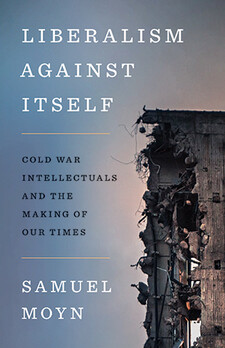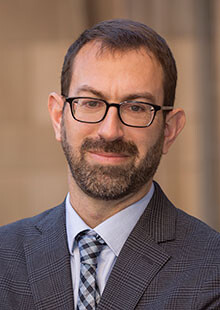Professor Samuel Moyn Finds the Roots of Liberalism’s Woes

In his new book, Professor Samuel Moyn looks back at an influential group of liberal intellectuals of the last century and finds in their work where, in his view, today’s liberals go wrong.

Liberalism Against Itself: Cold War Intellectuals and the Making of Our Times (Yale University Press) recounts how a group that included political theorists, philosophers, and others remade liberalism in the postwar years. Moyn, Chancellor Kent Professor of Law and History at Yale University, shows how these thinkers — Isaiah Berlin, Gertrude Himmelfarb, Karl Popper, Judith Shklar, Lionel Trilling and those in their orbit — redefined their movement’s ideals. However, Moyn argues, the ideas they put forth hardly helped their cause.
“Cold War liberalism was a catastrophe — for liberalism,” Moyn declares at the start of the book.
Having lived through the horrors of the 20th century — World War II, the Holocaust, and Stalinism — the group that later became known as the Cold War Liberals developed a new strain of liberalism for their times. They presented liberalism as an alternative to totalitarianism while being careful to distinguish it from communism. One difficulty, according to Moyn: communism had claimed as its own what used to be some of liberalism’s most appealing features, progress among them. Rather than reclaim these ideals, Moyn is distressed to note, the Cold War liberals downplayed or rejected them.
“The most important fact about Cold War liberal political theory is how profoundly it broke with the liberalism it inherited,” Moyn writes.

The difference, Moyn explains, is the liberalism of the 19th and early 20th centuries, grounded in the ideas of John Stuart Mill and other Enlightenment thinkers, had a sweeping vision of freedom and worldwide emancipation. After World War II, leading thinkers made liberalism much smaller and less inspiring by making freedom from the state its central tenet. In doing so, Moyn shows, the Cold War liberals gave fuel to others who could actively harm the movement. He shows how early neoliberals borrowed from the Cold War liberals and set the stage for Reaganism. One of the thinkers Moyn profiles, Gertrude Himmelfarb, went on to become a founding figure of neoconservatism.
Moyn shows how the theories of the Cold War liberals have had remarkable staying power — in his view, to the detriment of liberalism. He describes how ideas developed in the 1940s and 50s were molded to fit the Vietnam War, the civil rights era, 9/11, and the Trump years. Moyn is critical of these many attempts to rehabilitate Cold War liberalism, finding the philosophy ill-suited to address each new threat to democracy. By continually resuscitating the same form of liberalism, he argues, liberals keep missing the opportunity to come up with something better.
“The endless revival of its Cold War version has been a means of avoiding the only hope for liberalism, which is to reinvent it beyond the terms we have known,” he writes.
Despite his frustration with liberals who can’t give up an idea that, he argues, has been shown repeatedly not to work, Moyn does see a future for liberalism. Though he does not recommend returning to earlier forms of liberalism entirely, he does find that some ideas central to liberalism before the Cold War are worth revisiting.
“Our best chance to save liberalism will be by reaching back to before the Cold War creed we have inherited for the sake of an entirely new version,” Moyn writes. “Reexamining the makings of Cold War liberalism reminds us that it matters less that we preserve and rescue traditions than that we exercise our freedom to reconfigure them beyond their limitations for the sake of our collective future.”
Moyn has written several books on the history of ideas and politics in the 20th century. His books include Humane: How the United States Abandoned Peace and Reinvented War (2021); Not Enough: Human Rights in an Unequal World (2018), Christian Human Rights (2015), based on Mellon Distinguished Lectures at the University of Pennsylvania in 2014; and The Last Utopia: Human Rights in History (2010). He has written for, or been interviewed by outlets including The New York Times, The Washington Post, The Atlantic, The New Republic, The Nation, Commonweal, and Dissent.


